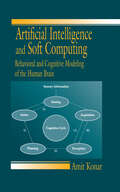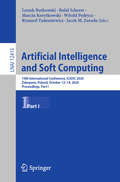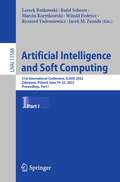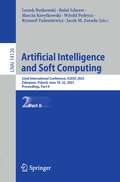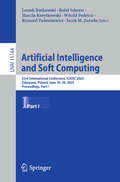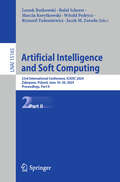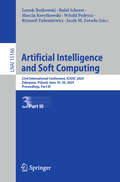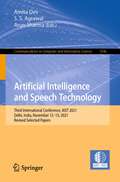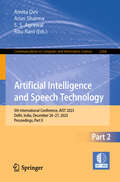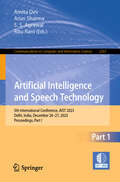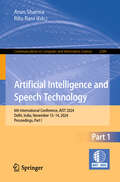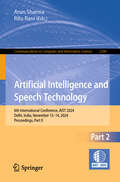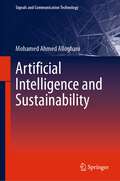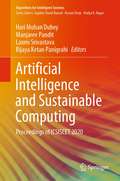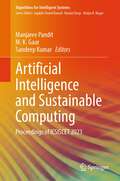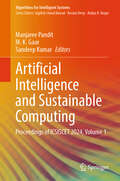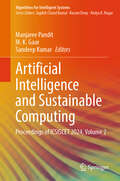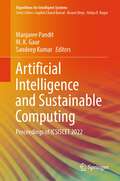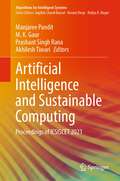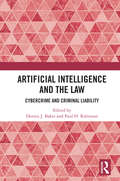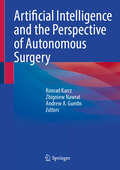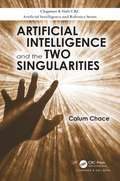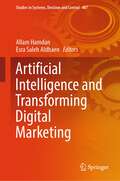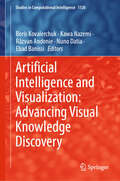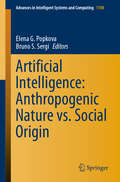- Table View
- List View
Artificial Intelligence and Soft Computing: Behavioral and Cognitive Modeling of the Human Brain
by Amit KonarWith all the material available in the field of artificial intelligence (AI) and soft computing-texts, monographs, and journal articles-there remains a serious gap in the literature. Until now, there has been no comprehensive resource accessible to a broad audience yet containing a depth and breadth of information that enables the reader to fully understand and readily apply AI and soft computing concepts.Artificial Intelligence and Soft Computing fills this gap. It presents both the traditional and the modern aspects of AI and soft computing in a clear, insightful, and highly comprehensive style. It provides an in-depth analysis of mathematical models and algorithms and demonstrates their applications in real world problems. Beginning with the behavioral perspective of "human cognition," the text covers the tools and techniques required for its intelligent realization on machines. The author addresses the classical aspects-search, symbolic logic, planning, and machine learning-in detail and includes the latest research in these areas. He introduces the modern aspects of soft computing from first principles and discusses them in a manner that enables a beginner to grasp the subject. He also covers a number of other leading aspects of AI research, including nonmonotonic and spatio-temporal reasoning, knowledge acquisition, and much more. Artificial Intelligence and Soft Computing: Behavioral and Cognitive Modeling of the Human Brain is unique for its diverse content, clear presentation, and overall completeness. It provides a practical, detailed introduction that will prove valuable to computer science practitioners and students as well as to researchers migrating to the subject from other disciplines.
Artificial Intelligence and Soft Computing: 19th International Conference, ICAISC 2020, Zakopane, Poland, October 12-14, 2020, Proceedings, Part I (Lecture Notes in Computer Science #12415)
by Leszek Rutkowski Rafał Scherer Marcin Korytkowski Witold Pedrycz Ryszard Tadeusiewicz Jacek M. ZuradaThe two-volume set LNCS 12415 and 12416 constitutes the refereed proceedings of of the 19th International Conference on Artificial Intelligence and Soft Computing, ICAISC 2020, held in Zakopane, Poland*, in October 2020.The 112 revised full papers presented were carefully reviewed and selected from 265 submissions. The papers included in the first volume are organized in the following six parts: neural networks and their applications; fuzzy systems and their applications; evolutionary algorithms and their applications; pattern classification; bioinformatics, biometrics and medical applications; artificial intelligence in modeling and simulation.The papers included in the second volume are organized in the following four parts: computer vision, image and speech analysis; data mining; various problems of artificial intelligence; agent systems, robotics and control.*The conference was held virtually due to the COVID-19 pandemic.
Artificial Intelligence and Soft Computing: 21st International Conference, ICAISC 2022, Zakopane, Poland, June 19–23, 2022, Proceedings, Part I (Lecture Notes in Computer Science #13588)
by Leszek Rutkowski Rafał Scherer Marcin Korytkowski Witold Pedrycz Ryszard Tadeusiewicz Jacek M. ZuradaThe two-volume set LNAI 13588 and 13589 constitutes the refereed post-conference proceedings of the 21st International Conference on Artificial Intelligence and Soft Computing, ICAISC 2022, held in Zakopane, Poland, during June 19–23, 2022.The 69 revised full papers presented in these proceedings were carefully reviewed and selected from 161 submissions. The papers are organized in the following topical sections:Volume I:Neural networks and their applications; fuzzy systems and their applications; evolutionary algorithms and their applications; pattern classification; artificial intelligence in modeling and simulation.Volume II:Computer vision, image and speech analysis; data mining; various problems of artificial intelligence; bioinformatics, biometrics and medical applications.
Artificial Intelligence and Soft Computing: 22nd International Conference, ICAISC 2023, Zakopane, Poland, June 18–22, 2023, Proceedings, Part II (Lecture Notes in Computer Science #14126)
by Leszek Rutkowski Rafał Scherer Marcin Korytkowski Witold Pedrycz Ryszard Tadeusiewicz Jacek M. ZuradaThe two-volume set LNAI 14125 and 14126 constitutes the refereed conference proceedings of the 22nd International Conference on Artificial Intelligence and Soft Computing, ICAISC 2023, held in Zakopane, Poland, during June 18–22, 2023.The 84 revised full papers presented in these proceedings were carefully reviewed and selected from 175 submissions.The papers are organized in the following topical sections:Part I: Neural Networks and Their Applications; Evolutionary Algorithms and Their Applications; and Artificial Intelligence in Modeling and Simulation.Part II: Computer Vision, Image and Speech Analysis; Various Problems of Artificial Intelligence; Bioinformatics, Biometrics and Medical Applications; and Data Mining and Pateern Classification.
Artificial Intelligence and Soft Computing: 23rd International Conference, ICAISC 2024, Zakopane, Poland, June 16–20, 2024, Proceedings, Part I (Lecture Notes in Computer Science #15164)
by Leszek Rutkowski Rafał Scherer Marcin Korytkowski Witold Pedrycz Ryszard Tadeusiewicz Jacek M. ZuradaThe two-volume set ICAISC 2024 15164, 15165 and 15166 constitutes the refereed proceedings of the 23rd International Conference on Artificial Intelligence and Soft Computing, ICAISC 2024, held in Zakopane, Poland, during June 16–20, 2024. The 96 full papers included in this book were carefully reviewed and selected from 179 submissions. They are organized in topical sections as follows: Part I -neural networks and their applications; pattern classification. Part II -evolutionary algorithms and their applications; artificial intelligence in modeling and simulation; computer vision, image and speech analysis. Part III - various problems of artificial intelligence; bioinformatics, biometrics and medical applications.
Artificial Intelligence and Soft Computing: 23rd International Conference, ICAISC 2024, Zakopane, Poland, June 16–20, 2024, Proceedings, Part II (Lecture Notes in Computer Science #15165)
by Leszek Rutkowski Rafał Scherer Marcin Korytkowski Witold Pedrycz Ryszard Tadeusiewicz Jacek M. ZuradaThe two-volume set ICAISC 2024 15164, 15165 and 15166 constitutes the refereed proceedings of the 23rd International Conference on Artificial Intelligence and Soft Computing, ICAISC 2024, held in Zakopane, Poland, during June 16–20, 2024. The 96 full papers included in this book were carefully reviewed and selected from 179 submissions. They are organized in topical sections as follows: Part I - neural networks and their applications; pattern classification. Part II - evolutionary algorithms and their applications; artificial intelligence in modeling and simulation; computer vision, image and speech analysis. Part III - various problems of artificial intelligence; bioinformatics, biometrics and medical applications.
Artificial Intelligence and Soft Computing: 23rd International Conference, ICAISC 2024, Zakopane, Poland, June 16–20, 2024, Proceedings, Part III (Lecture Notes in Computer Science #15166)
by Leszek Rutkowski Rafał Scherer Marcin Korytkowski Witold Pedrycz Ryszard Tadeusiewicz Jacek M. ZuradaThe two-volume set ICAISC 2024 15164, 15165 and 15166 constitutes the refereed proceedings of the 23rd International Conference on Artificial Intelligence and Soft Computing, ICAISC 2024, held in Zakopane, Poland, during June 16–20, 2024. The 96 full papers included in this book were carefully reviewed and selected from 179 submissions. They are organized in topical sections as follows: Part I -neural networks and their applications;pattern classification. Part II -evolutionary algorithms and their applications;artificial intelligence in modeling and simulation;computer vision, image and speech analysis. Part III - various problems of artificial intelligence;bioinformatics, biometrics and medical applications.
Artificial Intelligence and Speech Technology: Third International Conference, AIST 2021, Delhi, India, November 12–13, 2021, Revised Selected Papers (Communications in Computer and Information Science #1546)
by Amita Dev S. S. Agrawal Arun SharmaThis volume constitutes selected papers presented at the Third International Conference on Artificial Intelligence and Speech Technology, AIST 2021, held in Delhi, India, in November 2021. The 36 full papers and 18 short papers presented were thoroughly reviewed and selected from the 178 submissions. They provide a discussion on application of Artificial Intelligence tools in speech analysis, representation and models, spoken language recognition and understanding, affective speech recognition, interpretation and synthesis, speech interface design and human factors engineering, speech emotion recognition technologies, audio-visual speech processing and several others.
Artificial Intelligence and Speech Technology: 5th International Conference, AIST 2023, Delhi, India, December 26–27, 2023, Proceedings, Part II (Communications in Computer and Information Science #2268)
by Amita Dev Arun Sharma S. S. Agrawal Ritu RaniThis two-volume set, CCIS 2267 and 2268, constitutes the refereed proceedings of 5th International Conference on Artificial Intelligence and Speech Technology, AIST 2023, held in Delhi, India, during December 26–27, 2023. The 71 papers presented in two volumes were carefully reviewed and selected from 235 submissions. Part I focuses on Speech Technology using AI and Part II focuses on AI innovations for CV and NLP. These volumes are organized in the following topical sections: Part I: Trends and Applications in Speech Processing; Recent Trends in Speech and NLP; Emerging trends in Speech Processing; Advances in Computational Linguistics and NLP. Part II: Recent Trends in Machine Learning and Deep Learning; Analysis using Hybrid technologies with Artificial Intelligence; Exploring New Horizons in Computer Vision Research; Applications of Machine Learning and Deep Learning.
Artificial Intelligence and Speech Technology: 5th International Conference, AIST 2023, Delhi, India, December 26–27, 2023, Proceedings, Part I (Communications in Computer and Information Science #2267)
by Amita Dev Arun Sharma S. S. Agrawal Ritu RaniThis two-volume set, CCIS 2267 and 2268, constitutes the refereed proceedings of 5th International Conference on Artificial Intelligence and Speech Technology, AIST 2023, held in Delhi, India, during December 26–27, 2023. The 71 papers presented in two volumes were carefully reviewed and selected from 235 submissions. Part I focuses on Speech Technology using AI and Part II focuses on AI innovations for CV and NLP. These volumes are organized in the following topical sections: Part I: Trends and Applications in Speech Processing; Recent Trends in Speech and NLP; Emerging trends in Speech Processing; Advances in Computational Linguistics and NLP. Part II: Recent Trends in Machine Learning and Deep Learning; Analysis using Hybrid technologies with Artificial Intelligence; Exploring New Horizons in Computer Vision Research; Applications of Machine Learning and Deep Learning.
Artificial Intelligence and Speech Technology: 6th International Conference, AIST 2024, Delhi, India, November 13–14, 2024, Proceedings, Part I (Communications in Computer and Information Science #2389)
by Arun Sharma Ritu RaniThis two-volume set, CCIS 2389 and CCIS 2390, constitutes selected papers presented at the 6th International Conference on Artificial Intelligence and Speech Technology, AIST 2024, held in Delhi, India, during November 13–14, 2024. The 40 full papers and 15 short papers presented in these proceedings were carefully reviewed and selected from 398 submissions.These papers focus on Speech Technology using AI and AI innovations for CV and NLP. They have been categorized under the following topical sections:- Part I : Trends and Applications in Speech Processing; Recent Trends in Speech and NLP; Emerging trends in Speech Processing; Advances in Computational Linguistics and NLP. Part II : Recent Trends in Machine Learning and Deep Learning; Analysis using Hybrid technologies with Artificial Intelligence; Exploring New Horizons in Computer Vision Research.
Artificial Intelligence and Speech Technology: 6th International Conference, AIST 2024, Delhi, India, November 13–14, 2024, Proceedings, Part II (Communications in Computer and Information Science #2390)
by Arun Sharma Ritu RaniThis two-volume set, CCIS 2389 and CCIS 2390, constitutes selected papers presented at the 6th International Conference on Artificial Intelligence and Speech Technology, AIST 2024, held in Delhi, India, during November 13–14, 2024. The 40 full papers and 15 short papers presented in these proceedings were carefully reviewed and selected from 398 submissions.These papers focus on Speech Technology using AI and AI innovations for CV and NLP. They have been categorized under the following topical sections:- Part I : Trends and Applications in Speech Processing; Recent Trends in Speech and NLP; Emerging trends in Speech Processing; Advances in Computational Linguistics and NLP. Part II : Recent Trends in Machine Learning and Deep Learning; Analysis using Hybrid technologies with Artificial Intelligence; Exploring New Horizons in Computer Vision Research.
Artificial Intelligence and Sustainability (Signals and Communication Technology)
by Mohamed Ahmed AlloghaniThis book gives readers the tools to craft AI systems that don't just thrive today, but endure sustainably into the future. Whether a trailblazer or an aspiring innovator, this book enables readers to resonate with the ambitions of software developers, data scientists, and AI practitioners. The author covers the latest techniques and best practices for energy efficiency, reducing carbon footprints, and ensuring fair and ethical AI. The book also addresses important issues such as AI governance, managing risks, and ensuring transparency. Topics covered include understanding the relationship between AI and sustainable development, strategies for building efficient AI systems, and ethical considerations in AI development, among others. The author includes case studies of companies and organizations that have successfully implemented sustainable AI software development practices. Therefore, this book will be of interest to AI practitioners, academics, researchers, and lecturers in computer science, artificial intelligence, machine learning and data sciences.
Artificial Intelligence and Sustainable Computing: Proceedings of ICSISCET 2020 (Algorithms for Intelligent Systems)
by Hari Mohan Dubey Manjaree Pandit Laxmi Srivastava Bijaya Ketan PanigrahiThis book presents the outcome of two-day 2nd International e-Conference on Sustainable and Innovative Solutions for Current Challenges in Engineering and Technology (ICSISCET 2020) held at Madhav Institute of Technology & Science (MITS), Gwalior, India, from December 18–19, 2020. The book extensively covers recent research in artificial intelligence (AI) that knit together nature-inspired algorithms, evolutionary computing, fuzzy systems, computational intelligence, machine learning, deep learning, etc., which is very useful while dealing with real problems due to their model-free structure, learning ability, and flexible approach. These techniques mimic human thinking and decision-making abilities to produce systems that are intelligent, efficient, cost-effective, and fast. The book provides a friendly and informative treatment of the topics which makes this book an ideal reference for both beginners and experienced researchers.
Artificial Intelligence and Sustainable Computing: Proceedings of ICSISCET 2023 (Algorithms for Intelligent Systems)
by Sandeep Kumar Manjaree Pandit M. K. GaurThis book presents high-quality research papers presented at the 5th International Conference on Sustainable and Innovative Solutions for Current Challenges in Engineering and Technology (ICSISCET 2023) held at Madhav Institute of Technology & Science (MITS), Gwalior, India, during October 21–22, 2023. The book extensively covers recent research in artificial intelligence (AI) that knit together nature-inspired algorithms, evolutionary computing, fuzzy systems, computational intelligence, machine learning, deep learning, etc., which is very useful while dealing with real problems due to their model-free structure, learning ability, and flexible approach. These techniques mimic human thinking and decision-making abilities to produce systems that are intelligent, efficient, cost-effective, and fast. The book provides a friendly and informative treatment of the topics which makes this book an ideal reference for both beginners and experienced researchers.
Artificial Intelligence and Sustainable Computing: Proceedings of ICSISCET 2024, Volume 1 (Algorithms for Intelligent Systems)
by Sandeep Kumar Manjaree Pandit M. K. GaurThis book presents high-quality research papers presented at the 6th International Conference on Sustainable and Innovative Solutions for Current Challenges in Engineering and Technology (ICSISCET 2024) held at Madhav Institute of Technology & Science (MITS), Gwalior, India, during October 26–27, 2024. The book extensively covers recent research in artificial intelligence (AI) that knit together nature-inspired algorithms, evolutionary computing, fuzzy systems, computational intelligence, machine learning, deep learning, etc., which is very useful while dealing with real problems due to their model-free structure, learning ability, and flexible approach. These techniques mimic human thinking and decision-making abilities to produce systems that are intelligent, efficient, cost-effective, and fast. The book provides a friendly and informative treatment of the topics which makes this book an ideal reference for both beginners and experienced researchers.
Artificial Intelligence and Sustainable Computing: Proceedings of ICSISCET 2024, Volume 2 (Algorithms for Intelligent Systems)
by Sandeep Kumar Manjaree Pandit M. K. GaurThis book presents high-quality research papers presented at the 6th International Conference on Sustainable and Innovative Solutions for Current Challenges in Engineering and Technology (ICSISCET 2024) held at Madhav Institute of Technology & Science (MITS), Gwalior, India, during October 26–27, 2024. The book extensively covers recent research in artificial intelligence (AI) that knit together nature-inspired algorithms, evolutionary computing, fuzzy systems, computational intelligence, machine learning, deep learning, etc., which is very useful while dealing with real problems due to their model-free structure, learning ability, and flexible approach. These techniques mimic human thinking and decision-making abilities to produce systems that are intelligent, efficient, cost-effective, and fast. The book provides a friendly and informative treatment of the topics which makes this book an ideal reference for both beginners and experienced researchers.
Artificial Intelligence and Sustainable Computing: Proceedings of ICSISCET 2022 (Algorithms for Intelligent Systems)
by Manjaree Pandit M. K. Gaur Sandeep KumarThis book presents high-quality research papers presented at 4th International Conference on Sustainable and Innovative Solutions for Current Challenges in Engineering and Technology (ICSISCET 2022) held at Madhav Institute of Technology & Science (MITS), Gwalior, India, from November 19 to 20, 2022. The book extensively covers recent research in artificial intelligence (AI) that knit together nature-inspired algorithms, evolutionary computing, fuzzy systems, computational intelligence, machine learning, deep learning, etc., which is very useful while dealing with real problems due to their model-free structure, learning ability, and flexible approach. These techniques mimic human thinking and decision-making abilities to produce systems that are intelligent, efficient, cost-effective, and fast. The book provides a friendly and informative treatment of the topics which makes this book an ideal reference for both beginners and experienced researchers.
Artificial Intelligence and Sustainable Computing: Proceedings of ICSISCET 2021 (Algorithms for Intelligent Systems)
by Manjaree Pandit M. K. Gaur Prashant Singh Rana Akhilesh TiwariThis book presents high-quality research papers presented at 3rd International Conference on Sustainable and Innovative Solutions for Current Challenges in Engineering and Technology (ICSISCET 2021) held at Madhav Institute of Technology & Science (MITS), Gwalior, India, from November 13–14, 2021. The book extensively covers recent research in artificial intelligence (AI) that knits together nature-inspired algorithms, evolutionary computing, fuzzy systems, computational intelligence, machine learning, deep learning, etc., which is very useful while dealing with real problems due to their model-free structure, learning ability, and flexible approach. These techniques mimic human thinking and decision-making abilities to produce systems that are intelligent, efficient, cost-effective, and fast. The book provides a friendly and informative treatment of the topics which makes this book an ideal reference for both beginners and experienced researchers.
Artificial Intelligence and the Law: Cybercrime and Criminal Liability
by Dennis J. Baker Paul H. RobinsonThis volume presents new research in artificial intelligence (AI) and Law with special reference to criminal justice. It brings together leading international experts including computer scientists, lawyers, judges and cyber-psychologists. The book examines some of the core problems that technology raises for criminal law ranging from privacy and data protection, to cyber-warfare, through to the theft of virtual property. Focusing on the West and China, the work considers the issue of AI and the Law in a comparative context presenting the research from a cross-jurisdictional and cross-disciplinary approach. As China becomes a global leader in AI and technology, the book provides an essential in-depth understanding of domestic laws in both Western jurisdictions and China on criminal liability for cybercrime. As such, it will be a valuable resource for academics and researchers working in the areas of AI, technology and criminal justice.
Artificial Intelligence and the Perspective of Autonomous Surgery
by Konrad Karcz Zbigniew Nawrat Andrew A. GumbsThis book has two heroes - the surgeon and the robot. The education system and intelligence can create a human who is specialized in surgery. While the accurate analysis of data with machine learning, AI, can create a more autonomous robot for surgery. Currently, robots still require human input in the decision-making loop, whether or not this will always be the case is an issue that still needs to be debated, analyzed and studied, preferably by computer scientists AND surgeons. Surgeons and their patients are increasingly opting for less invasive surgeries. However, among their many advantages, there is an important issue: less invasiveness always means limited access to direct information from the operating field (3D image, local palpation sensations, all information about the "whole" patient and feedback from the accompanying team during teleoperation). To increase precision, we are increasingly using surgical robots and mechatronic instruments. The less invasive the surgery and the greater the precision of robotic micro-instruments, the greater the role of artificial intelligence methods, especially machine learning, which supports the surgeon in making decisions, planning and performing the procedure. The development of artificial intelligence and further evidence of its effectiveness in various application fields mean that the work of a doctor is changing today. In the book, we address the issue of AI surgery, asking whether this means that an AI surgeon will be created? A key question about autonomous surgical robots will come up regularly: how far can we go with their autonomy while maintaining safe and effective procedures? The book provides useful information on both early successes, failures, and expectations related to the development of new technologies in surgery. It is a guide written by various experts, intended for a wide audience: from medical development planners, through students, to doctors and decision-makers.
Artificial Intelligence and the Two Singularities (Chapman & Hall/CRC Artificial Intelligence and Robotics Series)
by Calum ChaceThe science of AI was born a little over 60 years ago, but for most of that time its achievements were modest. In 2012 it experienced a big bang, when a branch of statistics called Machine Learning (and a sub-branch called Deep Learning) was applied to it. Now machines have surpassed humans in image recognition, and they are catching up with us at speech recognition and natural language processing. Every day, the media reports the launch of a new service, a new product, and a new demonstration powered by AI. When will it end? The surprising truth is, the AI revolution has only just begun. Artificial Intelligence and the Two Singularities argues that in the course of this century, the exponential growth in the capability of AI is likely to bring about two "singularities" - points at which conditions are so extreme that the normal rules break down. The first is the economic singularity, when machine skill reaches a level that renders many of us unemployable and requires an overhaul of our current economic and social systems. The second is the technological singularity, when machine intelligence reaches and then surpasses the cognitive abilities of an adult human, relegating us to the second smartest species on the planet. These singularities will present huge challenges, but this book argues that we can meet these challenges and overcome them. If we do, the rewards could be almost unimaginable. This book covers: • Recent developments in AI and its future potential • The economic singularity and the technological singularity in depth • The risks and opportunities presented by AI • What actions we should take Artificial intelligence can turn out to be the best thing ever to happen to humanity, making our future wonderful almost beyond imagination. But only if we address head-on the challenges that it will raise. Calum Chace is a best-selling author of fiction and non-fiction books and articles, focusing on the subject of artificial intelligence. He is a regular speaker on artificial intelligence and related technologies, and runs a blog on the subject at www.pandoras-brain. com. Prior to becoming a full-time writer and speaker, he spent 30 years in business as a marketer, a strategy consultant, and a CEO. He studied philosophy at Oxford University, where he discovered that the science fiction he had been reading since boyhood was simply philosophy in fancy dress.
Artificial Intelligence and Transforming Digital Marketing (Studies in Systems, Decision and Control #487)
by Allam Hamdan Esra Saleh AldhaenThis book explores how AI is transforming digital marketing and what it means for businesses of all sizes and looks at how AI is being used to personalize content, improve targeting, and optimize campaigns. This book also examines some of the ethical considerations that come with using AI in marketing.
Artificial Intelligence and Visualization: Advancing Visual Knowledge Discovery (Studies in Computational Intelligence #1126)
by Ebad Banissi Kawa Nazemi Boris Kovalerchuk Răzvan Andonie Nuno DatiaThis book continues a series of Springer publications devoted to the emerging field of Integrated Artificial Intelligence and Machine Learning with Visual Knowledge Discovery and Visual Analytics that combine advances in both fields. Artificial Intelligence and Machine Learning face long-standing challenges of explainability and interpretability that underpin trust. Such attributes are fundamental to both decision-making and knowledge discovery. Models are approximations and, at best, interpretations of reality that are transposed to algorithmic form. A visual explanation paradigm is critically important to address such challenges, as current studies demonstrate in salience analysis in deep learning for images and texts. Visualization means are generally effective for discovering and explaining high-dimensional patterns in all high-dimensional data, while preserving data properties and relations in visualizations is challenging. Recent developments, such as in General Line Coordinates, open new opportunities to address such challenges.This book contains extended papers presented in 2021 and 2022 at the International Conference on Information Visualization (IV) on AI and Visual Analytics, with 18 chapters from international collaborators. The book builds on the previous volume, published in 2022 in the Studies in Computational Intelligence. The current book focuses on the following themes: knowledge discovery with lossless visualizations, AI/ML through visual knowledge discovery with visual analytics case studies application, and visual knowledge discovery in text mining and natural language processing. The intended audience for this collection includes but is not limited to developers of emerging AI/machine learning and visualization applications, scientists, practitioners, and research students. It has multiple examples of the current integration of AI/machine learning and visualization for visual knowledge discovery, visual analytics, and text and natural language processing. The book provides case examples for future directions in this domain. New researchers find inspiration to join the profession of the field of AI/machine learning through a visualization lens.
Artificial Intelligence: Anthropogenic Nature vs. Social Origin (Advances in Intelligent Systems and Computing #1100)
by Elena G. Popkova Bruno S. SergiThis book presents advanced research studies on the topic of artificial intelligence as a component of social and economic relations and processes. It gathers research papers from the International Research-to-Practice Conference “The 21st Century from the Positions of Modern Science: Intellectual, Digital and Innovative Aspects” (May 23–24, 2019, Nizhny Novgorod, Russia) and the International Research-to-Practice Conference “Economics of Pleasure: a Science of Enjoying Economic Activities” (October 3–5, 2019, Prague, Czech Republic). Both conferences were organized by the Autonomous Non-Profit Organization “Institute of Scientific Communications” (Volgograd). What sets this book apart from other publications on the topic of artificial intelligence is that it approaches AI not as a technological tool, but as an economic entity. Bringing together papers by representatives of various fields of social and human knowledge, it systematically reflects on various economic, social, and legal aspects of the creation, application, and development of artificial intelligence. Given the multidisciplinary nature of its content, the book will appeal to a broad target audience, including those engaged in developing AI (scientific research institutes and universities), and Industry 4.0 enterprises interested in its implementation, as well as state regulators for the digital economy.
